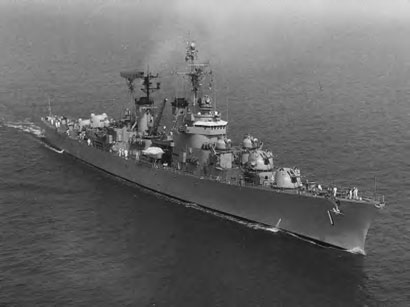
|
|
History of USS Norfolk A seaport in southeastern Virginia on Hampton Roads.
USS Norfolk was the first major United States warship built since World War II, and the second ship to be named for the city of Norfolk, Virginia. She was authorized in 1947 as an anti-submarine hunter killer ship that could operate under all weather conditions and would carry the latest radar, sonar, and other electronic devices. As a large destroyer leader designed on a light cruiser hull she could carry a greater variety of detection gear than a regular size destroyer. The keel of the second Norfolk was laid down 1 September 1949 by the New York Shipbuilding Corp., Camden. NJ, and launched 29 December 1951. She was sponsored by Miss Betty King Duckworth; and commissioned 4 March 1953, with Capt. Clarence Matheson Bowley in command. Norfolk was the largest of the five destroyer leaders. She displaced 6,360 tons, had an overall length of 540 feet, a beamwidth of 54 feet and a draft of 26 feet. Her full compliment consisted of 411 officers and enlisted men. She was capable of making a top speed of 32 knots. Her armament consisted of four dual 3-inch gunmounts, sixteen 20 mm antiaircraft guns, an ASROC, and eight 21-inch torpedo tubes. In late 1954/early 1955, USS Norfolk was stationed at the naval shipyard at Newport, RI. During this time frame several sea trials were conducted off the New England coast. On one of these cruises she experienced a problem in the port shaft. The shaft split and the screw dropped off. The sudden loss of many tons of the brass screw caused the high-speed turbines to rev up to such speeds that the blades began flying all over the port engine room rupturing steam lines and tearing off the packing on the pipes. Four members of the engine room crew were burned by hot steam. The engine room looked like the aftermath of a pillow fight! The ship steamed back to port on one engine and one screw. She was put into dry dock at the Charlestown, Mass., shipyard. A huge section of the port side was removed and the engine removed. Since she had the only two engines of this kind in existence the manufacturer would have to build a new one. The side of the ship was welded back on. An investigation took place which suggested that "metal fatigue" caused by the shaft being misaligned had caused the shaft to giveaway. As a consequence of this finding, all four other DLs were inspected for the possibility of the same problem. After the ship was pronounced sea worthy, she left Boston and steamed around the Caribbean, visiting Cuba, Haiti, Puerto Rico and taking part in all the normal fleet activities associated with Gitmo training exercises. All this was done with one engine and one screw. Those who stood helm watches can attest to the fact that getting use to maneuvering with only one engine and screw was an experience. But once it was mastered, it wasn't bad at all. In 1955 she went into dry dock in Norfolk, VA. The side was reopened, the new engine and screw installed and all four gun mounts were replaced with the new 3" 70 caliber dual mounts. This now put USS Norfolk back into service with full capabilities of a warship and she began normal operations. After her Caribbean shakedown cruise (February 1954), Norfolk was
assigned to the Atlantic Fleet. Then after she was refitted with
the new engine and guns she went on another shakedown and training
cruise to Gitmo. Between 1955 and 1957 she served successively as
flagship for Commander Destroyer Flotillas 2, 4, and 6. During 1956
and 1957 she acted as flagship for Commander Destroyer Force, Atlantic
Fleet. In June 1957, Norfolk participated in the International Fleet
Review as flagship for Admiral Jerauld Wright, Commander-in-Chief
Atlantic Fleet and Supreme Allied Commander Atlantic. In the fall of 1961 she took part in UNITAS II as flagship for Commander Cruiser Destroyer Flotilla 2. During the operation she performed ASW training exercises with the navies of Venezuela, Colombia, Ecuador, Peru, Chile, Argentina, Uruguay, and Brazil. Norfolk repeated this cruise over the next five years during which she served as flagship of Commander South Atlantic Forces except in 1962 when she was flagship for Commander Cruiser Destroyer Forces Atlantic Fleet. Norfolk joined LANTFLEX 66 as flagship between 28 November and 16 December 1966. During this exercise she was shadowed by the Russian trawlers Repiter and Teodilit. She proved her antisubmarine capabilities again as flagship for Commander South Atlantic Forces during UNITAS VIII in Fall 1967. Norfolk was assigned to Commander Middle East Forces as flagship (17 April-15 October 1968). On this mission she visited Bahrain, French Somaliland, Saudi Arabia, Ethiopia. Kenya, the Seychelles, Mauritius, Malagasy Republic, India, Pakistan, Australia, New Zealand, Tahiti, Mexico, and Panama Canal Zone. In October 1968 the USS Norfolk returned to Norfolk, VA, where she was decommissioned 15 January 1970 and entered the Atlantic Reserve Fleet. Submitted by Al Marquis, Historian
|
